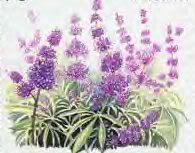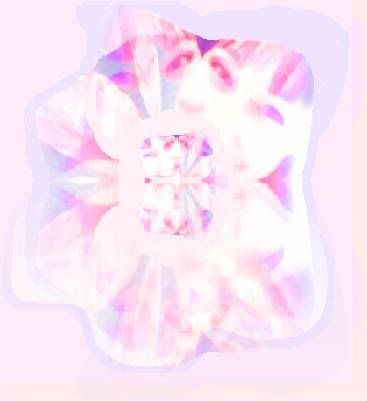Mood:
Topic: Aromatherapy
 The last time we discussed aromatherapy...(see entry for 6/29/05)...I left off by explaining that Aromatherapy is the term we use for affecting our health in a positive way, by bringing balance to the system through scent, and that essential oils are the tools that we use in administering this therapy in a clinical way.
The last time we discussed aromatherapy...(see entry for 6/29/05)...I left off by explaining that Aromatherapy is the term we use for affecting our health in a positive way, by bringing balance to the system through scent, and that essential oils are the tools that we use in administering this therapy in a clinical way.
In other words, there are many, many, MANY health benefits to walking in nature and enjoy the scents. There are likewise many benefits to cooking with natural spices and foods and filling the house with good smells! BUT...It's hard to administer something like that in targeted doses to bring about specific results--that's why we use essential oils.
Concentrated, pure essential oils are very powerful and effective healing agents, when administered consistently in specific ways. They are not to be used indescriminately, because they do have very potent effects, but used with respect, they can be extremely powerful tools. They work to support the body in its own restoration by supporting, strengthening, relaxing, stimulating, tonifying or invigorating the systems, organs, cells, and/or the skin during the healing process.
Essential oils may be used in a number of ways, inhalation being just one. When applied topically, plant constituents enter the bloodstream directly, taking it a step further than simple "aroma"-therapy. This is the same technology which allows nicotine or morphine patches to work. Medicine often uses this way of administering a substance into our bloodstream.
While essential oils should be used with respect and with care, they still remain a very safe treatment and preventative aid. Fragrant oils have been in use for thousands and thousands of years In ancient scripture you'll read about people being annointed and healed with oils. They were even presented to Jesus upon his birth. There is evidence of the use of fragrant oils as far back as 7,000 B.C.  The fragrance of perfumes (the early form of essential oils) could still be smelled when they opened up King Tut's tomb 3,000 years after his death!
The fragrance of perfumes (the early form of essential oils) could still be smelled when they opened up King Tut's tomb 3,000 years after his death!
Essential oils are produced through a process of distillation. This is the same process as used for many perfumes fragrant oils used for other purposes besides medicinal, but the medicinal oils are from the first distillation. (Plants are distilled a number of times, with each distillation a little bit weaker...sort of along the same lines as using one tea bag for more than one cup of tea.)
Essential Oils are to be taken externally, except under the supervision of somebody trained in the art. In France and other European countries where doctors practice medical aromotherapy, they often administer essential oils in pill form, in addition to through diffusion, or via the skin or by suppository. This is not, however, advisable in common practice. It is better for those not thouroughly trained to be very cautious. It is much better to err on the side of caution and use them externally only.
It is important to note that although essential oils often have similar characteristics to the herbs from which they come, they do not act in the body the same way as herbs, because they do not contain proteins, carbohydrates or lipids, although they do have phytonutrient content. Essential oils are highly concentrated substances containining volatile organic components. Each oil has its own unique, complex composition as is made up of approximately 250-300 different chemical consitituents of active molecules, and may be toxic if taken internally except as directed by a qualified professional. They are not in the form of a whole plant anymore, and so in a sense, they are more of a natural "drug," whereas herbs are actually food.
Also due to their strength, essential oils, when applied to the skin, should be diluted in a carrier base. NEAT is the term used for applying the oils full-strength, and the only two oils that are advisable to apply neat are lavender and tea tree oils. If you skin becomes irritated when applying any of these oils, you may relieve this with a good quality vegetable oil.
What is a good quality vegetable oil? You should only use cold pressed oils for any of your kitchen needs! Oils are meant to be nutritional food sources, not something to clog up our system. We need to be using oils that are in their natural form. Most oils on the grocery store shelf, unfortunately, are unfit for use, as they no longer are of nutritional benefit. These oils are processed with heat and chemicals (such as gasoline) which kill the nutritients and chemically alter the oil. We'll talk more in depth at a future time regarding the various benefits and dangers of using the right or wrong oil.
In regard to the topic at hand, it is likewise important to only use the best, most nourishing oils on our skin. Cold pressed virgin olive oil is my favorite oil for cooking, as it stands up to oxidation when heated the best, however, for purposes of Armotherapy, this is not the best oil to choose, although it is extremely good for the skin. The scent of olive oil, unfortunately, is considered too strong by many, as it may interfere with the scent of the essential oil. I do use it, however, in many of the blends that I make. Make sure whatever carrier oils that you use are:
*Cold pressed - ensure that the vitamins, minerals, essential fatty acids and other nutrients are left intact, making it a therapeutic oil in itself.
*Free of sythetic ingredients.
*Light and non-greasy.
*NOT MINERAL OIL!
Some very nice oils include:
*Sweet Almond - Shelf life of 6-8 months. Contains glucosides,minerals, vitamins, and is very rich in protein. Good for all skin types. Helps relieve itching, soreness, dryness and inflammation.
*Grapeseed - Shelf life 3 months. Stands up the best to light of all the oils. Contains vitamins, minerals and proteins, and is good for all skin types.
*Hazelnut - Shelp life 6 months. Contains vitamins, minerals and protein. Good for all skin types. Has a slight astringent action.
*Macadamia - Very, very nice oil! My favorite choice for use in creams. Shelf life 1 year.
*Apricot Kernel - Shelf life 6-8 months. Contains vitamins and minerals, and is particularly good for aged, sensitive, inflamed and dry skin.
*Jojoba - Doesn't get rancid! Should get solid in fridge if pure. Jojoba is not actually an oil, but a wax extracted from the bean of the jojoba plant. Contains protein and minerals. Mimics collagen. Good for inflamed skin, psoriasis, eczema, acne, hair care. Highly penetrative. Use in a 10% dilution. (There are more!)
Essential oils, then, may be mixed with these carrier oils and applied to the skin. Use about 15-18 drops of essential oils in 1 ounce of carrier oil. Close the container tightly, and tap gently on the heel of the hand 100 times to thoroughly mix. This process is called "succussion." Apply this oil liberally, but not so liberally that it does not soak into the skin.
Oil is not the only carrier which is suitable for aromatherapy use. Don't forget about breathing them in! Air is a good carrier, too! You may breath them in direct from the bottle, or put them in a diffuser which will carry the scent through the room. Mmmmm...What a wonderful way to feel good! :-D 
For a very nice steam inhalation for general use, try this: 4C boiling water in bowl 2-4 drops of essential or citrus oil (eucalyptus smithii is a very nice oil for general use in this way) Cover head with towel and inhale, resting every few moments and then returning to inhale some more.
Water is also a carrier, and essential oils may certainly be added to bathwater. I do this every day! You may add them direct, or mix them in with whatever else you put in the tub, such as mineral salts, baking soda, botanical oils, or whatever else you may use.
Essential oils inthe bath are very nice for aches, pains, tension, stress....ahhhhh! Take me away!!! Fill the tub with water of a comfortable temperature. Use 7-10 drops of essential oil (5-7 drops for citrus oils) Sit in the tub for 10-20 minutes and just relax! Please don't use any synthetic soaps, gels, shampoos, etc., during this 10-20 minutes, as this is a therapeutic bath, and synthetic ingredients will greatly reduce the effects. (Although hopefully you are not using synthetic ingredients in your soaps, gels and shampoos anyway, as these are toxic to you!)
Compresses, poultices, baths, inhalations, massage oils...there are many ways essential oils can be used! I would recommend that you get a good basic book on aromatherapy and the use of essential oils.
There are many essential oils from which you can choose. I would recommend starting with a good basic set of oils, which might include the following:
*Lavender - This, in my opinion, would have to get the #1 Usefulness Award! Lavender oil can be used NEAT, making it top in convenience, and it has sooooo many practical uses. It can be used to relieve headaches, pain, tension, depression, insomnia, burns, scalds, cuts, wounds, naseau, acne, eczema, blisters, fevers, heart palpitations...so many things! It has a very nice fragrance, that almost everyone likes, and it is very safe for children and for the elderly. Psychologically, lavender imparts a sense of well-being. PLUS...bugs don't like it so much!
*Peppermint - Peppermint oil has a real yummy smell, and it is very useful in so many ways! It mixes well with lavender, too. Peppermint aids digestion and helps to relieve nausea, flatulence, and indigestion. Being a hepatic, it is also very tonifying to the liver. Another characteristic of peppermint is that it will cool you down when you're too hot, and warm you up when you're too cold. It is cooling to emotions, making it useful to help relieve anger; and it is stimulating to concentration and thereby helpful in relieving mental fatigue. I like to carry it when traveling, as it provides good relief from air, car, or sea sickness, none of which make very fun traveling mates! Peppermint should be well diluted, especially when using with infants and children. It should not be used by nursing mothers, as it may inhibit milk flow.
Peppermint oil is especially nice to use with inhalations, as it is a good decongestion, and helps to relieve dry cough and cold symptoms. It is not as good in the bath, because it tends to make one feel cold.
*Tea Tree Oil - There are hundreds of practical uses for tea tree oil! It's not necessarily one of the best smelling essential oils, but it is a very effective antiseptic, bactericidal, fungicidal, and anti-viral agent. It is appropriate for a myriad of uses, including cystitis, vaginitis, yeast infection, clods, flu, bronchitits, sore throat, skin absesses, gum problems, fungal infections, viral and bacterial infections, warts, acne...the list goes on and on! Niaouli is an oil that is very similar to tea tree oil...even better, actually, just not quite as well known.
There are so many more very good oils you could choose! 
Citrus oils are similar to essential oils, except that they are not obtained through steam distillation, but rather by being expressed. These are extremely nice oils to use, as they are very pleasant to smell, and they all have the quality of being anti-depressant aromas. They're known as the Happy Family of Oils!
Citrus oils should not, however, be taken lightly, as they are very powerful powerful and aggressive oils. It is also good to keep in mind not to apply them to skin that will be exposed to the sun, as the presence of citrus oil may cause brown spots on the skin, due to their photsensitivity to ultra violet rays.
The citrus oils are very detoxifying oils, and are very good for use in cleaning everything from livers to floors! Citrus oils and essential oils can be used in combination with themselves and each other, and in fact, the benefit of each oil is improved by their combined action. You should, however, limit it to only about two or three oils at a time.
Bergamot is a citrus oil, and is among my favorites for lifting my spirits! I like it in combination with ylang ylang and geranium, which are both essential oil which are very uplifting and balancing to the emotions as well. I just LOVE using these oils!
We'll talk about more ways to make good use of aromatherapy and essential oils. They have so many good uses, not only with people, but with animals, too. They can be used in so many products, like cleaning solutions, beauty applications, fat patches, pesticides, air fresheners, sore muscle rubs, love potions (it's true!), toothpaste, healing salves, and all sorts of really neat things!
In the beginning, it's good to just start with one oil, and become thoroughly acquainted with it. Close your eyes and breathe it in deep to begin, and then write down in descriptive words how it smells and any thoughts that it brings to you. This will help to imprint the memory of it on your mind! Then start using it in a number of ways, and take note of any results that you get. Then add another oil!
In thinking about how to advise someone who asks the best course of action to take when working with improving their state of well-being, my inclination is to begin by working with aromatherapy first for two weeks, before adding other components into the regime, unless more aggressive action is called for. Aromatherapy prepares the mind and the body for other modalities, if others indeed do need to be used. (Essential oils combine well with herbs and with flower essences, but they are not to be used with homeopathics, as they cancel each other out. As a matter of fact, essential oils should not even be kept in the same cupboard with homeopathy products! This is as I was taught.)
Aromatherapy is a very gentle, effective way of working with all aspects of being...physical, emotional, and spiritual benefits are all to be enjoyed. We'll talk more about the many uses of essential oils many, many more times! There are so many wonderful ways they are used! Have a very good time smelling and feeling real great! 
Mary Jo Eshelman, ND, CTN, CNHP allnatureworks@aol.com
The information presented is the author's personal and professional opinion, and is intended for educational purposes only. Nothing printed here is designed to take the place of a physician's advice. If you are experiencing problems with your health, it is recommended that you consult with a licensed health care professional. All Natural HealthWorks! is not responsible for any damages or ill-effects resulting from the information presented herein, nor do we make any recommendations regarding your health. We are simply here as a resource for you in making your own choices for your health yourself.
Updated: Friday, 8 February 2008 7:33 AM EST
Post Comment | Permalink | Share This Post


